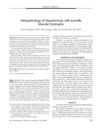Search
for
Sort by
Research
30 / 91 results
research Potency of Leaf Extracts of Cocor Bebek (Kalanchoe Pinnata) as Hair-Growth Promoting Agent
Cocor Bebek leaf extract may promote hair growth better than minoxidil at high concentrations.
research Scalp Threading – New Treatment Option for Androgenetic Alopecia
Scalp Threading is a promising new treatment for hair loss that may work better than current options.

research Minoxidil Sulfate Is the Active Metabolite That Stimulates Hair Follicles
Minoxidil sulfate stimulates hair growth.

research Localization of Minoxidil Sulfotransferase in Rat Liver and the Outer Root Sheath of Anagen Pelage and Vibrissa Follicles
Minoxidil works in liver and outer hair root sheath for hair growth.
research Hair Growth Effects of Wheat Sprout Ethanol Extract on C57BL/6 Mice
Wheat sprout extract (fr. 5) promotes hair growth similar to minoxidil.
research Low Level Laser Treatment for Patterned Hair Loss: A Systematic Review
Low level laser therapy may promote hair growth for patterned hair loss, but more research is needed.
research Effectivity of Minoxidil as a Treatment for Alopecia Areata
Minoxidil can effectively treat patchy hair loss by stimulating hair growth.
research Hair Loss Following Kerion Celsi: A Follow-Up Examination
Most patients had less hair growth in affected areas after treatment.

research Topical Products for Human Hair Regeneration: A Comparative Study on an Animal Model
Minoxidil was the most effective treatment for hair regrowth in rats compared to Aminexil or Kerium.
research Activity And Safety Tests Study Of Ethanolic Extract Of Hibiscus Leaves (Hibiscus Rosa Sinensis L.) Hair Tonic In Hair Growth Of Male Rabbits
The 10% hibiscus leaf extract hair tonic promotes better hair growth than 2% minoxidil but can irritate eyes.

research Minoxidil Stimulates Mouse Vibrissae Follicles in Organ Culture
Minoxidil can help grow hair in mice by making cells grow and improving hair quality. More research needed.

research Sulfation of Minoxidil by Human Platelet Sulfotransferase
Human platelets change minoxidil to minoxidil sulfate, helping blood vessels widen.

research Herbal Lotions to Regrow Hair in Patients with Intractable Alopecia Areata
Herbal lotions are effective for severe hair loss, with a 64.8% success rate, but relapse is common and long-term management requires allergen control and possible corticosteroid use.

research Evaluation of Hair Growth Promoting Activity of Sansevieria Trifasciata P. on Androgenic Alopecia in Male Rabbits
Sansevieria trifasciata P. extracts, especially the ethyl acetate fraction, effectively promote hair growth in male rabbits with hair loss.

research Integrated Chemometric Fingerprints of Antioxidant Activities and HPLC-DAD-CL for Assessing the Quality of the Processed Roots of Polygonum Multiflorum Thunb. (Heshouwu)
The research identified 12 antioxidant compounds in Polygonum multiflorum roots, suggesting these as quality markers for the plant's processed roots.
research Identification of Novel Hair-Growth Inducers by Means of Connectivity Mapping
Fluphenazine and iloprost can induce hair growth.

research A Systematic Review on Topical Marketed Formulations, Natural Products, and Oral Supplements to Prevent Androgenic Alopecia
Various treatments, including FDA-approved drugs, natural products, and oral supplements, can help with hair loss, but a patient's medical history and potential allergies should be considered when choosing a treatment.
research Bioactive-Based Cosmeceuticals: An Update on Emerging Trends
Natural ingredients in cosmeceuticals are beneficial for skin and hair health with few side effects.

research Histopathology of Hypotrichosis with Juvenile Macular Dystrophy
The research found that a specific gene mutation causes fewer hair follicles and disrupted hair growth cycles, leading to thin and short hair in people with Hypotrichosis with Juvenile Macular Dystrophy.

research Potentiality of Hair Growth Promoting Activity of Aqueous Extract of Abrus Precatorius Linn. on Wistar Albino Rats
The Abrus precatorius extract can effectively promote hair growth similar to standard treatments.

research The Evaluation and Management of Hirsutism
Hirsutism in women often indicates a hormonal imbalance and can be managed with a combination of hormonal treatments and hair removal methods.

research Review of Herbal Hair Serum: Rosemary, Hibiscus, Neem
The herbal hair serum with rosemary, hibiscus, and neem is safe and effective for hair care.

research Stem Cells as a Target for the Delivery of Active Molecules to Skin by Topical Administration
Topical treatments can deliver active molecules to skin stem cells, potentially helping treat skin and hair disorders, including skin cancers and hair loss.

research The Evaluation and Management of Hirsutism
Most women with excess hair growth have an underlying hormonal issue, often treated with medication and hair removal methods.

research Skin Transcriptome Reveals the Intrinsic Molecular Mechanisms Underlying Hair Follicle Cycling in Cashmere Goats Under Natural and Shortened Photoperiod Conditions
Changing light exposure can affect hair growth timing in goats, possibly due to a key gene, CSDC2.

research Cellular and Extracellular Involvement in the Regeneration of the Rat Lower Vibrissa Follicle
Both cell and non-cell parts are important for rat whisker follicle regrowth.

research Comparing Classic and Newer Phenotypes in Greek PCOS Women: The Prevalence of Metabolic Syndrome and Their Association with Insulin Resistance
Greek women with classic PCOS are more likely to have metabolic syndrome and insulin resistance than those with newer PCOS types.

research Formulation and Evaluation of Herbal Hair Oil
Herbal hair oil made with natural ingredients helps reduce hair loss, dandruff, and graying.

research The Shifting Preferences of Patients and Physicians in Nonsurgical Hair Loss Treatment
Minoxidil and Finasteride are the most popular hair loss treatments, with rising interest in other options, and economic or health crises can change what treatments people prefer.